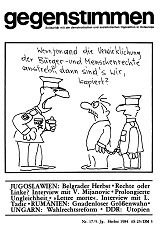
Jugoslawien - An Veselin Đuranović - Präsident des Staatspräsidiums der SFRJ
Open letter from Vladimir Mijanović to Veselin Đuranović
More...We kindly inform you that, as long as the subject affiliation of our 300.000+ articles is in progress, you might get unsufficient or no results on your third level or second level search. In this case, please broaden your search criteria.

Open letter from Vladimir Mijanović to Veselin Đuranović
More...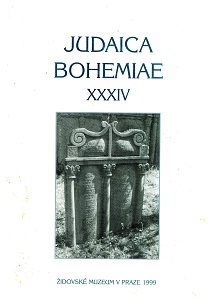
The article provides a comprehensive bibliography of Jewish associations in Prague, focusing on their publication activities in the 19th century and occasionally the late 18th century. It aims to continue the work of previous compilations, particularly Dr. Otto Muneles' "Bibliographical Survey of Jewish Prague," which documented Hebraica and Judaica from 1512-1951. The bibliography lists statutes, annual reports, jubilee collections, address books, and lectures published by these associations, excluding Zionist and Czech-Jewish organizations, which are to be covered separately. The primary source for this compilation was the extensive collection of the Jewish Museum in Prague's library, especially the pamphlet collection of the former Prague Jewish Religious Community's library. Many publications were lost during WWII when the library was confiscated and relocated multiple times, leading to gaps and losses in the bibliography. Where original prints were unavailable, the bibliography relied on secondary sources, including the handwritten catalog of the former library and heuristics in the Jewish Museum's library and older collections of the National Library of the Czech Republic. The bibliography includes books, yearbooks, almanacs, and works reproduced by other techniques, excluding periodicals and manuscripts.
More...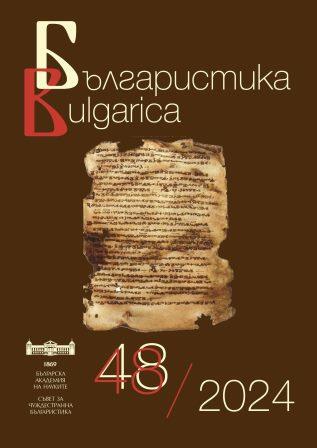
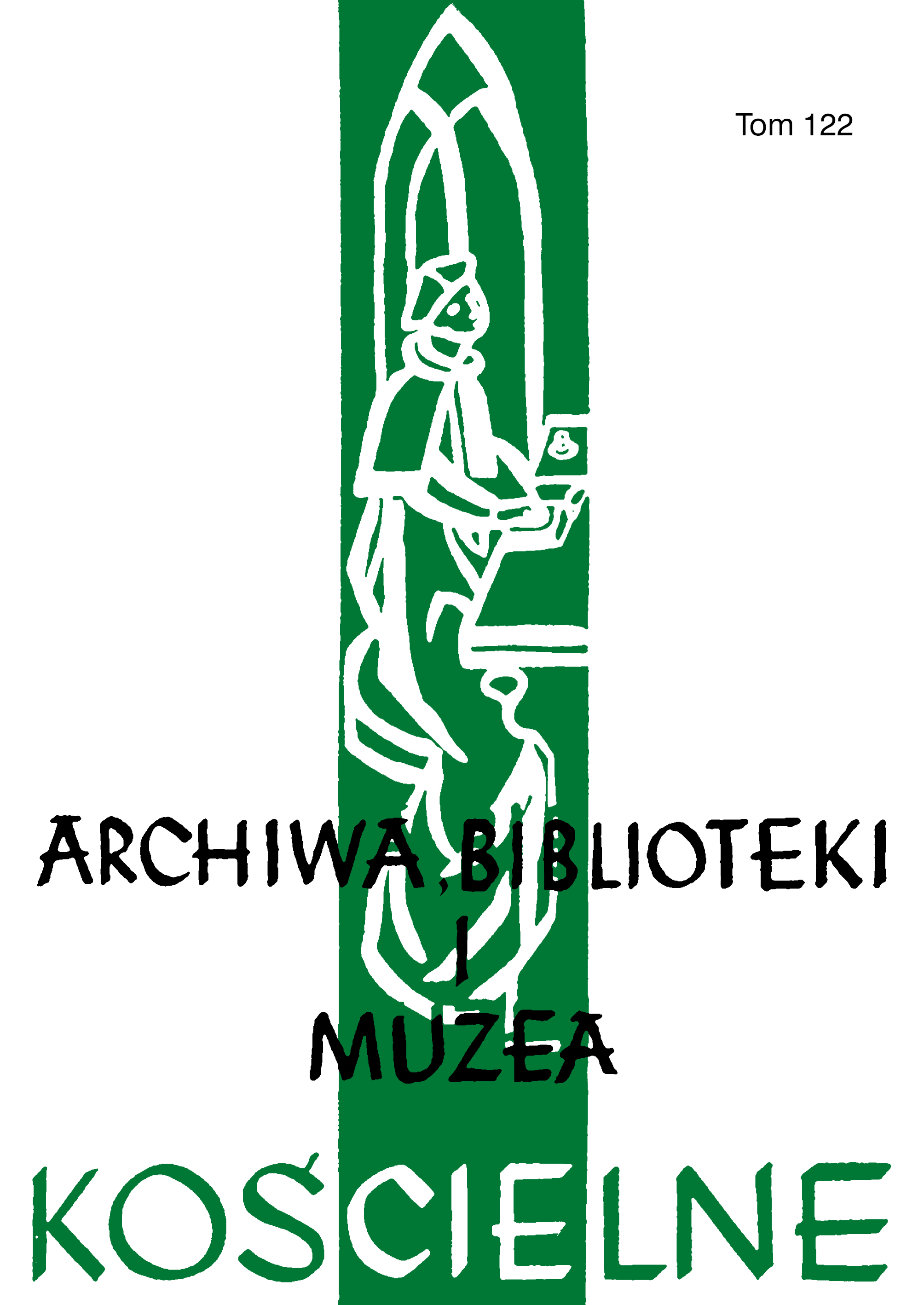
The publication of ordos and directories in the Diocese of Lublin was a standard procedure from the beginning of the diocese, that is, from the first decade of the 19th century. The external shape and publishing order were modelled on similar prints published in the Chełm Diocese, of which the Lublin Diocese became the successor. During the period of partition, both ordos and directories were published almost annually. A search revealed that this was done in the interwar era without any omissions. Relatively easy to access today, publications from 1919–1939 are collected in a complete set in several Lublin libraries and archives, but are also disseminated in online form thanks to an initiative to digitize them. Ordos and directories of the Diocese of Lublin were published only in Lublin. They were written in Latin and Polish. The ordos included primarily the liturgical calendar, but also a range of other information relating to worship, as well as some of the more commonly used prayers. The directories included information about the institutions and clergy of the Lublin Diocese that was useful in the work of the bishop’s curia and parish offices. Regardless of the reliable resource base of the Lublin Archdiocesan Archives, which enables in-depth studies of Lublin’s church organization and its religious life, ordos and directories remain important source publications and interesting objects of research.
More...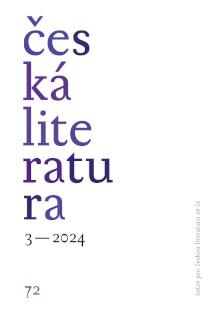
Using material from the mutual correspondence between Ludvík Vaculík and Helena Bukovanská, this study aims to shed light on some aspects of the genesis of the novel Český snář [A Czech Dreambook] and Vaculík’s artistic method in general. A number of practices from the field of correspondence permeate the writer’s original artistic work. The constitution of literary fact is shown through three kinds of textual and thematic intersections between personal letters and the novel: separate texts dealing with the same theme, paraphrases, and finally, on the basis of two letters which, after the modifications analysed in the study, went into the final text of the novel.
More...
The article is an attempt to answer questions about the fate of a girl, the owner of a „school diary” found on the grounds of the former German concentration camp at Majdanek. Who was the owner of the diary, what was the fate of her family? Did anyone in the diary survive? The diary was kept from December 1941 to March 1943. The last entry was made in Warsaw, several days before the ghetto uprising.
More...
Faptul că litigiul are ca obiect cererea de constatare a existenței dreptului de proprietate asupra disponibilităților bănești existente într-un depozit bancar, deschis pe numele debitoarei, care a parcurs procedura insolvenței, precum și realizarea dreptului sub forma remiterii sumei către reclamant nu atrage automat competența judecătorului sindic, ale cărui atribuții sunt reglementate de art. 45 din Legea nr. 85/2014. Astfel, având în vedere că reclamantul urmărește constatarea dreptului de proprietate asupra disponibilităților bănești existente în contul debitoarei, față de care s-a închis procedura insolvenței, și obligarea băncii la plata acestora către reclamant, în cauză sunt aplicabile normele de procedură prevăzute la art. 35 C. proc. civ. și cele de drept substanțial de la art. 557 și art. 2192 C. civ. Prin urmare, competența materială și teritorială de soluționare a cauzei în primă instanță nu se poate stabili potrivit normelor prevăzute art. 120 C. proc. civ. și dispozițiilor speciale privind procedura insolvenței, ci în virtutea dispozițiilor dreptului comun.
More...
Raportul de cauzalitate este nu doar o condiție a răspunderii, ci și criteriul după care se stabilește întinderea obligației de despăgubire. Decelarea acestei condiții nu este întotdeauna facilă, legătura de cauzalitate se configurează adesea într-un complex de împrejurări, cu interacțiuni diferite în producerea rezultatului, iar acestea trebuie examinate fiecare în parte spre a putea determina care dintre ele, singular ori împreună, au condus, în mod indivizibil, la producerea pagubei. Cauza prejudiciului nu poate fi identificată întotdeauna ca fiind singulară ori izolată, ci trebuie determinată prin evaluarea modului în care ea este favorizată de alte elemente, chiar secundare, care concură, înlesnesc sau favorizează, în cele din urmă, paguba. Toate împrejurările evocate pot provoca un context care, în sine, se poate identifica într-o etiologie unică și caracterizează, într-un caz particular, legătura de cauzalitate care concură la demonstrarea răspunderii civile. Or, în măsura în care instanța de apel a avut în vedere examinarea legăturii de cauzalitate numai prin evaluarea unui singur șir de elemente, evaluate ca indispensabile, dar a ignorat altele, la rândul lor esențiale, integrate aceluiași context, analiza legăturii de cauzalitate, condiție a răspunderii civile, este insuficientă, ceea ce nu corespunde unei aplicări corecte a legii.
More...
I) Însăși Directiva nr.17/2014 are ca premisă aplicarea principiului nominalismului (împrumutatul suportă riscul valutar), dar obligă statele membre să adopte o reglementare specială, derogatorie, de natură să asigure protecția consumatorilor, cu aplicabilitate numai pentru viitor, adică pentru contractele care vor fi încheiate sub imperiul unei asemenea reglementări. Prin urmare, în materia creditelor în valută, problema riscului valutar la care este expus consumatorul nu este susceptibilă de a fi soluționată pe calea unor acțiuni întemeiate pe Legea nr.193/2000, având în vedere faptul că riscul valutar este suportat de consumator nu în temeiul unei pretinse clauze abuzive din contractul de credit, ci este consecința aplicării nominalismului consacrat de lege. Obligația contractuală de a rambursa creditul în moneda în care a fost contractat creditul reprezintă transpunerea în practică a principiului nominalismului monetar care nu poate fi interpretat în favoarea consumatorului. II) Perceperea de către bancă a unei sume de bani consistente lunar (comisionul de adminstrare), duce la un dezechilibru semnificativ între drepturile și obligațiile părților, exprimat prin plata de către un consumator a unui cost al creditului care în fapt este o dobândă mascată și reprezentând evident o clauză abuzivă.
More...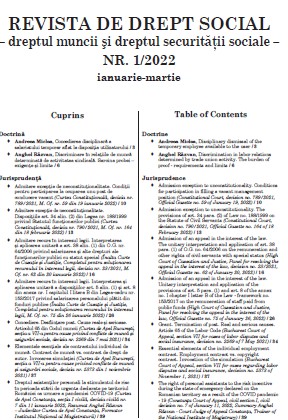
Înalta Curte de Casație și Justiție, Completul pentru dezlegarea unor chestiuni de drept, decizia nr. 61/2022, M. Of. nr. 1.172 din 7 decembrie 2022
More...
i) Dispozițiile art. 4 alin. (1) lit. c) din Legea nr. 77/2016 nu instituie decât condiția ca, creditul să fi fost contractat de consumator cu scopul de a achiziționa, construi, extinde, moderniza, amenaja, reabilita un imobil cu destinație de locuință sau, indiferent de scopul pentru care a fost contractat, este garantat cu cel puțin un imobil având destinația de locuință”, nu și condiția ca imobilul să fie folosit pe post de locuință chiar de către consumator. ii) Legea specială nu prevede modalitatea concretă în care se realizează echilibrarea contractului. Cu toate acestea, având în vedere art. 4 alin. (1) lit e) și alin. (1 ind.1) din aceeași lege care privesc impreviziunea, se constată că echilibrarea reprezintă, în fapt, adaptarea contractului în ipoteza impreviziunii. iii) Măsurile de adaptare a contractului, stabilite de părți, ca urmare a unui proces de negociere, ori de instanța sesizată în temeiul Legii nr. 77/2016, nu pot fi aplicate retroactiv, astfel cum rezultă cu claritate din deciziile Curții Constituționale, prestațiile executate rămânând câștigate contractului. De aceea, sintagma "pentru viitor" se referă la un moment ulterior celui la care se produce riscul supraadăugat, respectiv data la care debitorul invocă impreviziunea în mod efectiv (data transmiterii notificării potrivit art. 5 din Legea nr. 77/2016).
More...
C.J.U.E., Camera a cincea, hotărârea din 22 februarie 2024, cauza C-661/22
More...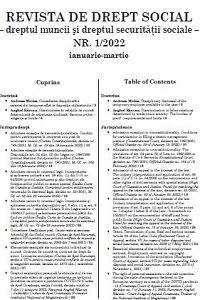
Curtea constată că, în circumstanțele cauzei, nici principiul nediscriminării și reglementarea cuprinsă în O.G. nr. 137/2000 și nici regula stabilirii salariului la nivelul funcțiilor similare prevăzută de art. 39 alin. (1) din Legea-cadru nr. 153/2017 nu justificau recunoașterea dreptului reclamantei de a beneficia de sporul de confidențialitate de 10 % pentru perioada în care nu a deținut autorizație de acces la informații clasificate, nivel „secret”. Faptul că reclamanta a obținut, după încetarea delegării de atribuții, autorizația de acces la informații clasificate secrete, contrar celor reținute de prima instanță, nu poate echivala cu o recunoaștere retroactivă a dreptului de a beneficia de sporul de confidențialitate, întrucât acordarea acestui drept salarial este condiționată și de existența unor atribuții ce presupun accesul la informații clasificate.
More...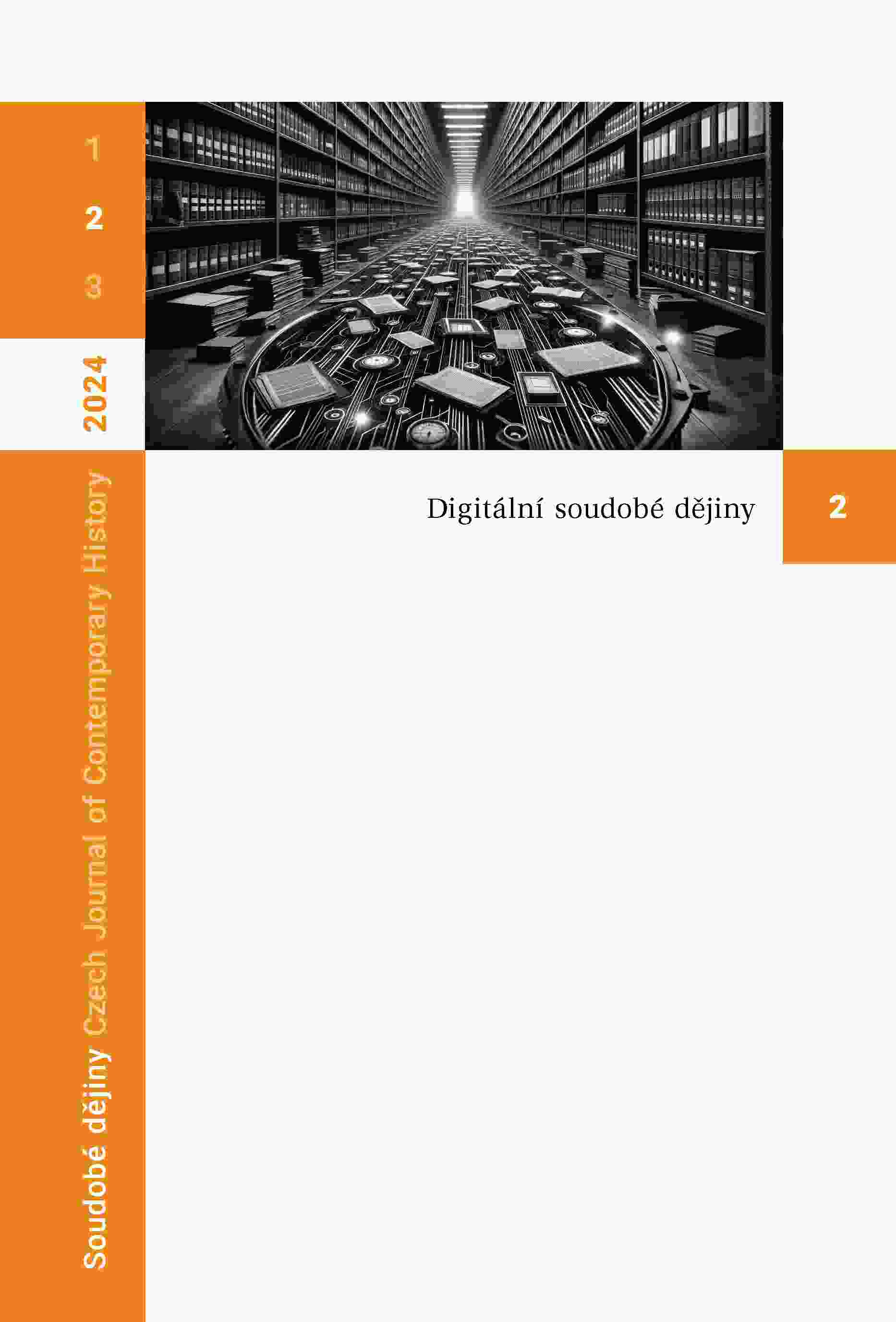
Developments in information technology and artificial intelligence are providing tools that have considerable potential to facilitate and enrich research in the fields of history and related sciences. A prerequisite for their effective use, however, is the most perfect conversion of analogue historical sources into machine-readable form, so that the search, classification and extraction of the information contained in them is as efficient as in born-digital sources. In their study, Kykal and Fišer first provide an overview of the development of digital libraries and the making available of the results of digitization in the Czech Republic, taking into account the different strategies and technological backgrounds of libraries and archives. They reflect on the limitations of full-text search and point out a surprising systemic deficit in current digital libraries, namely the absence of the diagnostics of the quality of machine transcription performed by Optical Character Recognition (OCR) programs. They then pay special attention to presenting the parameters and possibilities of the Digital Reading Room of the Ministry of Defence of the Czech Republic (Digitální studovna Ministerstva obrany ČR, DSMO), which is based on the Kramerius Digital Library system. Thanks to its role as an aggregator of the digitization production of the memory institutions of the Ministry of Defence, the Reading Room makes available both library documents and digitized items from archive collections and museum collections. Using the example of a printed periodical of the Austro-Hungarian Army from the First World War, the process of the additional enhancement of OCR results using the PERO tool (Czech abbreviation for pokročilá extrakce a rozpoznávání obsahu – Advanced Extraction and Recognition of Content) is presented, including enrichment with a metadata scheme which captures the layoutof graphic and text objects (Analysed Layout and Text Objects, ALTO) and allows the precise localization of the searched text on the digitized image. Using this program, the textual content of not only printed or typewritten texts, but also handwritten texts, can be retrieved much more efficiently and with noticeably higher quality. Moreover, the data in the ALTO scheme could be used to automatically monitor the quality of OCR results. This procedure would significantly increase the usability of semantic search, machine translation, summarization and many other artificial intelligence tools that are yet to be fully deployed in the Czech Digital Library environment.
More...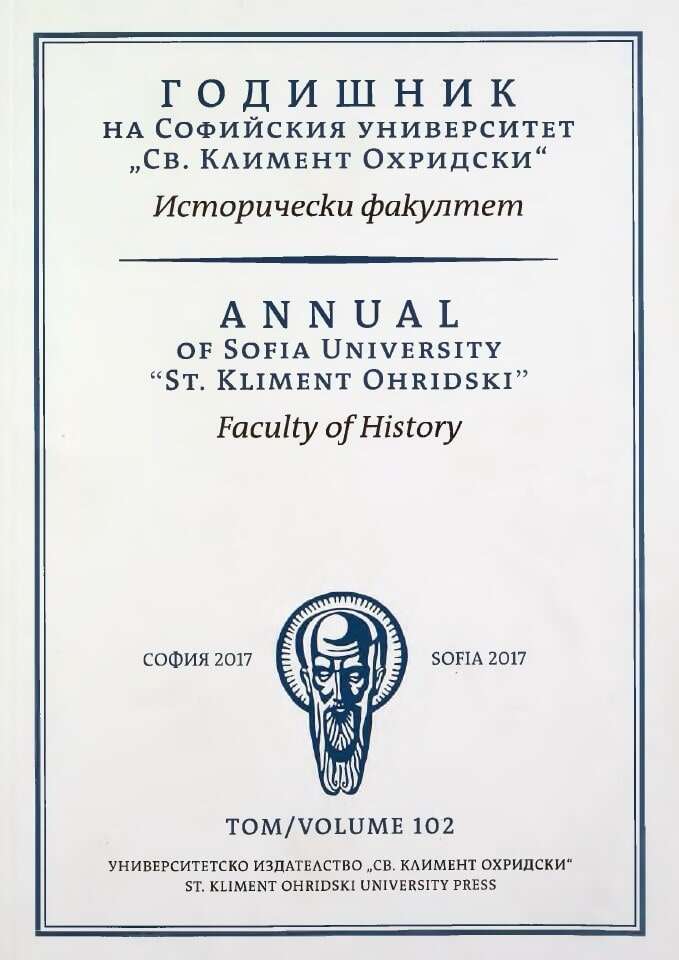
The article is dedicated to the person of Hayton (Hetum) of Corycos, a historian from Cylician Armenia from the end of the 13th and the beginning of the 14th centuries and his main work, known as “Flower of the Histories of the Oriental Land” or „History of the Tatars“. Hayton was a member of a prominent aristocratic family, branch of the royal dynasty of the Hetumids, a significant political leader and active promoter of the Union between the Roman Catholic and the Armenian Church. His treatise was addressed to the Avignon Papacy and the French King and aimed to convince them to offer generous support to his native Cylician Armenia, and to popularize the idea of an anti-Egyptian coalition among the West, Armenia and the Tatar-Mongol Ilkhanide rulers of Iran. The article presents also the main ideas of the treatise. It is followed by a full translation from Latin into Bulgarian of the Latin version of the treatise, which followed immediately the Old French original, which has been consulted. The translation is based on the edition of Charles Kohler from 1906.
More...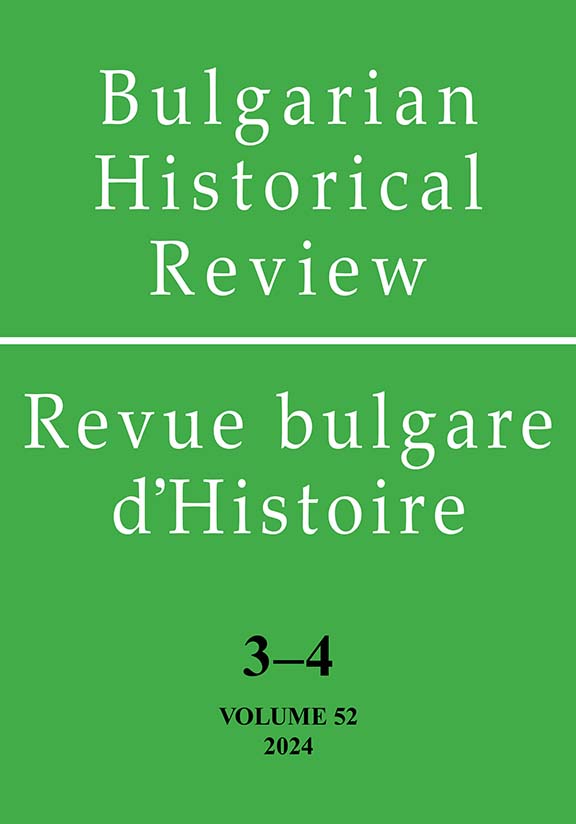
The goal of the article is to present the content of press reports that appeared in ‘Dziennik Poznański’ regarding Prince Alexander von Battenberg’s stay in Lviv in August 1886 to explain the great interest in this event among the Poles living on the territory of the Prussian annexation. The source basis of the presented text are press information printed in ‘Dziennik Poznański’, taken both from foreign press titles and from the newspaper’s special envoy, as well as reprints from Lviv-based Polish-language periodicals. The one-day stay of the dethroned Bulgarian ruler in Lviv caused an exceptionally lively reaction from the Polish population. It was caused, on the one hand, by sympathy for the young, tormented Prince, and on the other (as indicated by the details of the visit) by a manifestation of patriotic feelings. The second aspect of Alexander von Battenberg’s visit seems to be the key issue in understanding the interest in this event in the Polish press in the Prussian partition.
More...
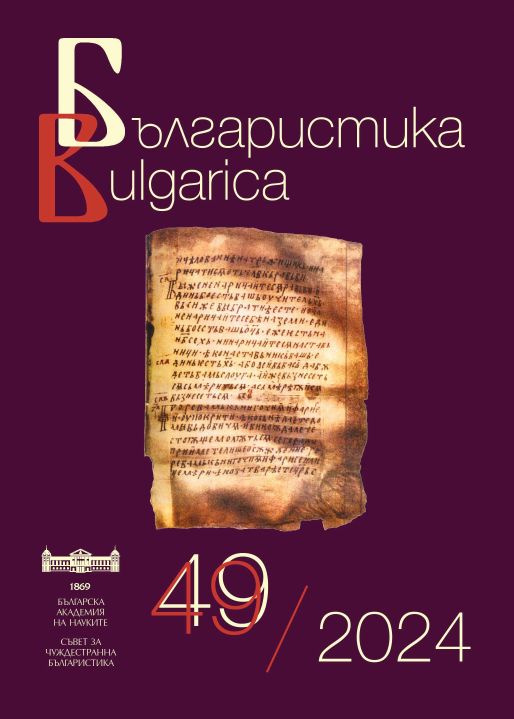

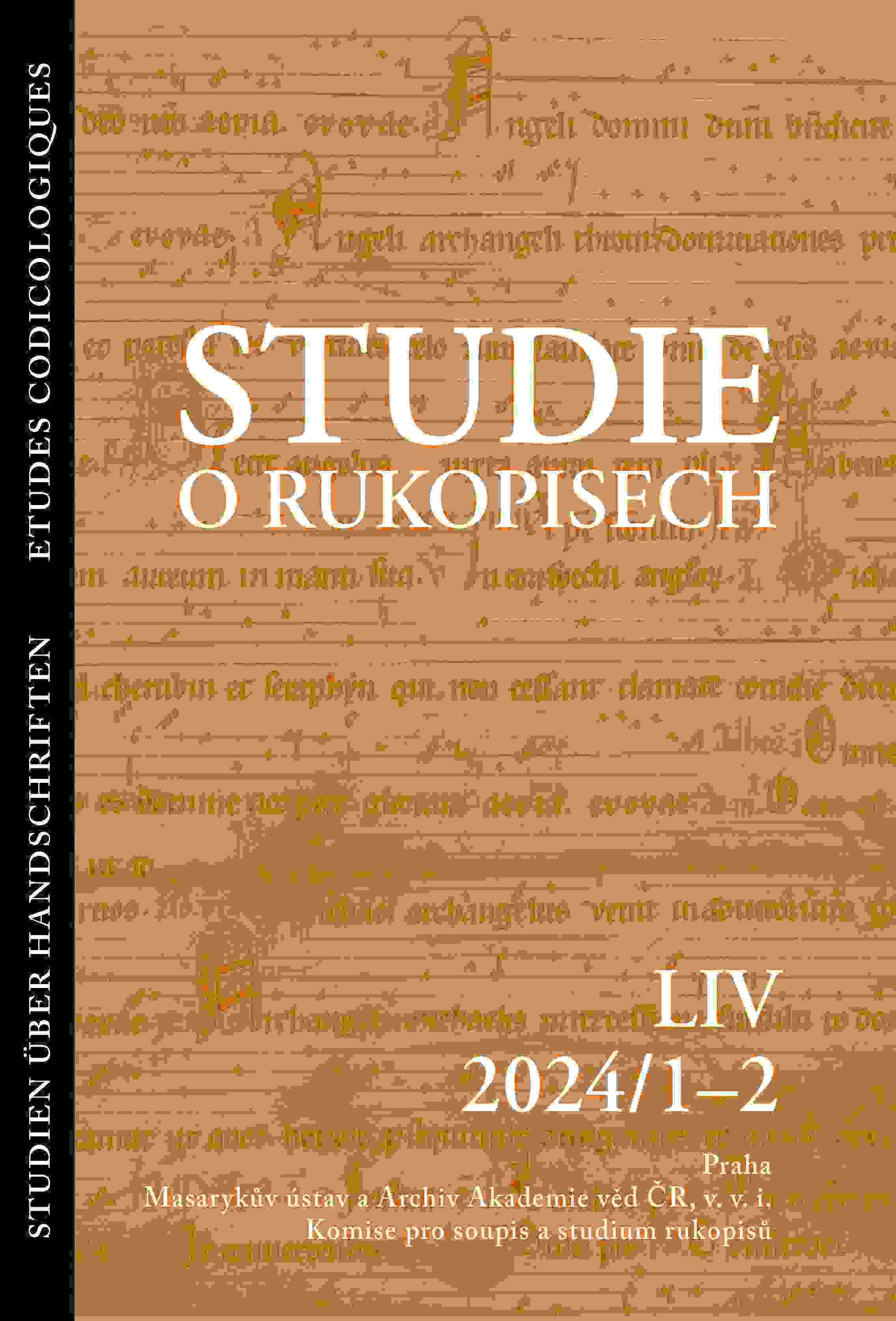
The study deals with a collection of approximately fifty manuscripts Bohemica from the defunct library in the Sternberg Palace in the Lesser Town of Prague. Most of the volumes were acquired by the last owner of the library, Franz Josef von Sternberg-Manderscheid (1763–1830). The manuscripts from the 14th–18th centuries come not only from the libraries of the first owners of the Lesser-Town palace but also from the Sternberg Palace at Hradčany, from the property of dissolved monasteries and literati brotherhoods, and from the literary estates of contemporary bibliophiles. Only less than twenty books can be linked to individual Sternbergs, with the largest group consisting of eleven volumes containing ex libris by the builder of the Hradčany Palace, Wenzel Adalbert von Sternberg (1643–1708). Some of the manuscripts of the Lesser-Town palace library are a valuable source for the history of Czech Baroque and Enlightenment historiography.
More...